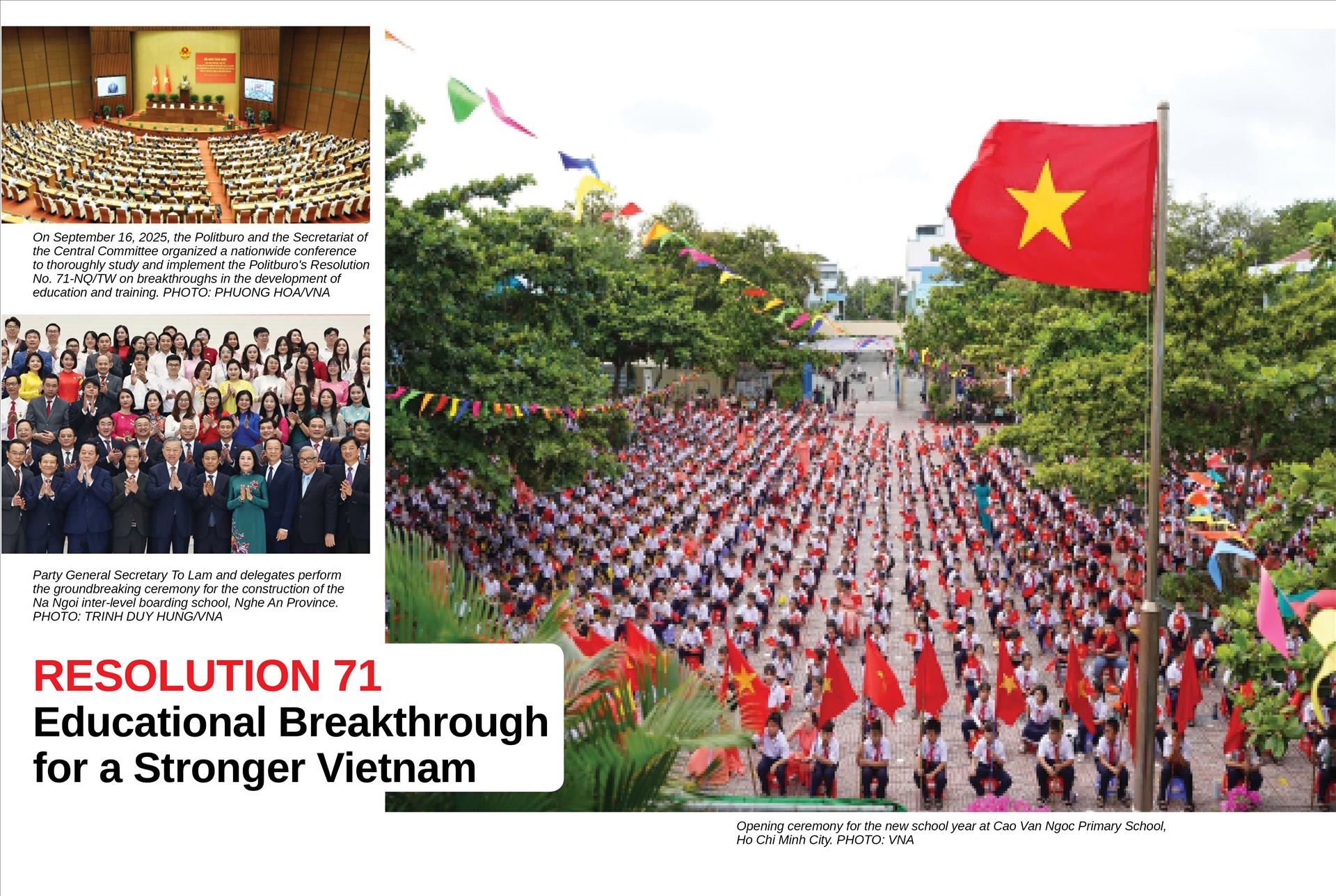Stemming from President Ho Chi Minh's teaching, "An ignorant people is a weak one," education has always been affirmed by the Party and the State as the top national policy and the foundation for the nation's development. Over 80 years, from the "eradicate illiteracy" movement to the current reform era (Doi Moi), Vietnamese education has made crucial contributions to the cause of national liberation, construction, and defense.
 Stemming from President Ho Chi Minh's teaching, "An ignorant people is a weak one," education has always been affirmed by the Party and the State as the top national policy and the foundation for the nation's development. Over 80 years, from the "eradicate illiteracy" movement to the current reform era (Doi Moi), Vietnamese education has made crucial contributions to the cause of national liberation, construction, and defense.
Stemming from President Ho Chi Minh's teaching, "An ignorant people is a weak one," education has always been affirmed by the Party and the State as the top national policy and the foundation for the nation's development. Over 80 years, from the "eradicate illiteracy" movement to the current reform era (Doi Moi), Vietnamese education has made crucial contributions to the cause of national liberation, construction, and defense.On August 22, 2025, Party General Secretary To Lam, on behalf of the Politburo, signed and promulgated Resolution 71-NQ/TW on breakthrough developments in education and training. This resolution further affirms that education is the key driving force determining the country's future and the "key" to realizing the aspiration of a powerful and prosperous Vietnam.
Party General Secretary To Lam and other leaders of the Party and State visit the exhibition "Outstanding Achievements in the Health and Education Sectors". Photo: Thong Nhat/VNA
Speaking at the online conference to deploy four important resolutions of the Politburo on September 16, 2025, Party General Secretary To Lam emphasizedthat investing in education is investing in, nurturing, and elevating the "national vitality", and investing in the nation's future. Accordingly, education and training must be developed under the motto: "Quality as the axis – Teachers as the core – Technology as the leverage".
Party General Secretary To Lam and delegates perform the groundbreaking ceremony for the construction of the Na Ngoi inter-level boarding school, Nghe An Province. Photo: Trinh Duy Hung/VNA
Party General Secretary To Lam presides over a meeting on the implementation status of the Politburo's Resolution No. 71–NQ/TW dated August 22, 2025, on breakthroughs in the development of education and training. Photo: Thong Nhat/VNA
Resolution 71 sets an ambitious goal that by 2045, Vietnam will have a modern, equitable, and quality national education system, ranking among the top 20 countries in the world. To achieve this, Resolution 71 calls for drastic institutional reform, creating specific mechanisms, special policies, and superior investment resources for the development of education and training. The resolution explicitly mandates that at least 20% of the state budget expenditure must be allocated to education and training, with a minimum of 5% for investment expenditure and 3% for higher education. This is a strong commitment that creates a firm financial foundation for educational development while opening a mechanism for the entire society to care for the "nurturing people" endeavor.
According to Minister of Education and Training Nguyen Kim Son, this is an exceptional opportunity for Vietnamese education to make a leap forward, as education is no longer just the sector's mission but has become central to the national development strategy.
People visit the booth of the Ministry of Education and Training at the National Achievement Exhibition "80 Years of Independence - Freedom - Happiness". Photo: Hoang Hieu/VNA
Specific, synchronized policies are being implemented, demonstrating the profound humanistic nature of a nation that values knowledge and is committed to "leaving no one behind". Notably, starting from the 2025-2026 academic year, the state will invest in building 248 inter-level primary and secondary boarding schools in border communes, and provide lunch support for primary and secondary students in disadvantaged areas, prioritizing remote mountainous border communes. In Hanoi alone, approximately 768,000 primary students (both public and private) will benefit from this policy.
For the teaching staff, Resolution 71 introduces a series of groundbreaking policies, including raising the minimum professional incentive allowance to 70% for pre-school and general education teachers; a minimum of 30% for staff; and 100% for teachers in extremely difficult areas, borders, islands, and ethnic minority regions. This step demonstrates the Party and State's deep respect and profound care for those who sow the seeds of knowledge.
Resolution 71 introduces a series of breakthrough policies, including increasing the preferential professional allowance for kindergarten and general education teachers and staff in areas facing extreme difficulties, border and island regions, and ethnic minority regions. Photo: Quoc Khanh/VNA
Starting from the 2025–2026 school year, the state will support lunch meals for primary and secondary school students in disadvantaged areas, prioritizing mountain border communes. Photo: Duc Tho/VNA
Beyond supporting teachers, Resolution 71 also includes policies to mobilize talented individuals from outside the traditional teaching force to participate in instruction, implement a regimen of co-affiliated faculty at educational institutions, and encourage experts to lead scientific research in schools. These mechanisms are expected to help bridge the educational gap between privileged and disadvantaged regions.
The Chi Xang Bo kindergarten and primary school satellite campus is located right next to the Da River in Tien Phong Commune (Phu Tho Province). Photo: Trong Dat/VNA
With its strategic vision, clear orientation, and strong commitment to resources, Resolution 71-NQ/TW is not only a major turning point for the education sector but also a roadmap for the aspiration of a powerful Vietnam - a place where every citizen can study, achieve comprehensive development, and contribute to the country's prosperous and intellectual future./.
By VNA Translated by Hong Hanh